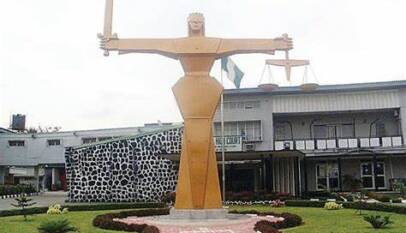By Didimoko A. Didimoko, Special Correspondent
Thousands of travellers and motorists face daily hardship due to the dilapidated sections of the crucial Benin–Warri highway axis of the East-West Highway, investigations by Naija Daily News have revealed.
Our findings show that commuters on the busy Benin-Warri highway—which links major state capitals, towns, and communities across the six South-South states—experience harrowing conditions due to the failed road infrastructure. The highway connects the six oil-producing hubs of the Niger Delta to Lagos and Abuja, Nigeria’s commercial and political capitals, respectively.
“To say sections of the Benin–Warri highway have collapsed is to be economical with the truth; there used to be a road, but not anymore,” said a traveller who spent over three hours on the barely 100-kilometre stretch. She spoke to our reporter on Friday morning.
Economic experts say the nation, businesses, and individuals lose billions of naira daily to increased logistics costs, wasted man-hours spent in idle traffic, theft, and other incidents resulting from the road’s deplorable state.

Benin – Warri Highway Shame of a Nation
According to our source, she left Lagos for Warri in the early hours of Thursday, but the journey—which ordinarily should take five hours—lasted over 12 hours due to multiple detours, traffic gridlocks, and vehicle breakdowns along the highway.
“The journey from Lagos to Benin was quite uneventful. Despite a break for lunch and the driver’s refreshment, we arrived in Benin within five hours. That was when another journey within the trip began,” she said.
She added that their exit from Benin City onto the Warri-Bening highway was significantly delayed due to the deplorable state of the exit routes—especially the Benin Bypass and Sapele Road exit that leads to the Benin–Warri section of the highway.
Our reporter recalls that the Bypass area and the Ogheghe–Iyanomo axis of Edo State have long been the subject of complaints by motorists and travellers due to massive craters and numerous failed sections. To save time, some drivers resort to an earthen road through the Rubber Research Institute at Iyanomo, Edo State.
“This route is longer and winds through several local communities, where youths often extort drivers under the pretense of a ‘development levy,’” she explained.
“There are craters on this road big enough to swallow a truck,” bemoaned a Libra Motors bus driver, who spent over one hour trying to get out his bus that was lodged inside a ditch.
After navigating those parts, travellers face long delays around the Ologbo/Koko Junction boundary between Edo and Delta States. John Bosco, a driver for a popular transport company that plies the route, likened the state of the road to a “journey through hell.”
“Most times, we have to pass through a narrow road inside Ologbo Community to avoid the long wait around the Paulosa Factory, where they’re replacing the asphalt with reinforced concrete. But that doesn’t guarantee a smooth passage, because many vehicles and trucks are also using that route. It becomes even worse when a truck breaks down or overturns, leading to total blockage,” he said.
Our findings reveal that Ologbo has become a major obstacle for most drivers and commuters, many of whom recounted ordeals of either abandoning their trips or spending the night in gridlock. Those travelling light often disembark and walk or take motorcycles across the blocked area into the neighbouring state, where they catch another vehicle to continue their journey.
In the past six months, however, the situation has deteriorated further, despite interventions by the Federal Ministry of Works. If anything, the intervention has worsened the plight of road users, as construction work has further reduced the space available for drivers to manoeuvre through the chaos.
“Worse still,” said Bosco, “the parts of the road that have been completed are barricaded, depriving drivers of access. For several months, long stretches—from Ugbenu (Koko Junction) through Ologbo—have been completed but remain locked off. Drivers are not allowed to use them.”
Angry motorists and commuters who spoke to our reporter during Friday’s gridlock accused the government of insensitivity. One commuter claimed, “It is clear that the government enjoys seeing people suffer. If not, why would they deliberately cordon off a completed road while users wallow in the mud?”
The fate of road users—especially those travelling beyond Warri into other parts of Delta and nearby states—is further complicated by gridlock caused by failed sections near Mercy Land/Army Estate and the ongoing construction of a flyover bridge at PTI Junction by the Delta State Government.
As a result, it reportedly takes up to three hours to reach Effurun Roundabout—a distance of less than two kilometres. To avoid the severe traffic at those points, motorists are forced to detour through Ohorhe to the Eku–Warri Road.
“All these detours and delays cause enormous damage to vehicles and also contribute to the high transport fares paid by travellers,” a commercial driver noted. Supporting this claim, our source said it currently costs ₦7,000 to travel from Warri to Benin—a distance of barely 100 kilometres.
Meanwhile, there seems to be no end in sight for road users. Our findings indicate that the contractor handling the road rehabilitation has left the site, although it could not be confirmed whether this was due to the rains or other factors.
Editor’s Note: Have you had any negative experiences on this road or other roads in Nigeria? email: naijadailynews2024@gmail.com





































